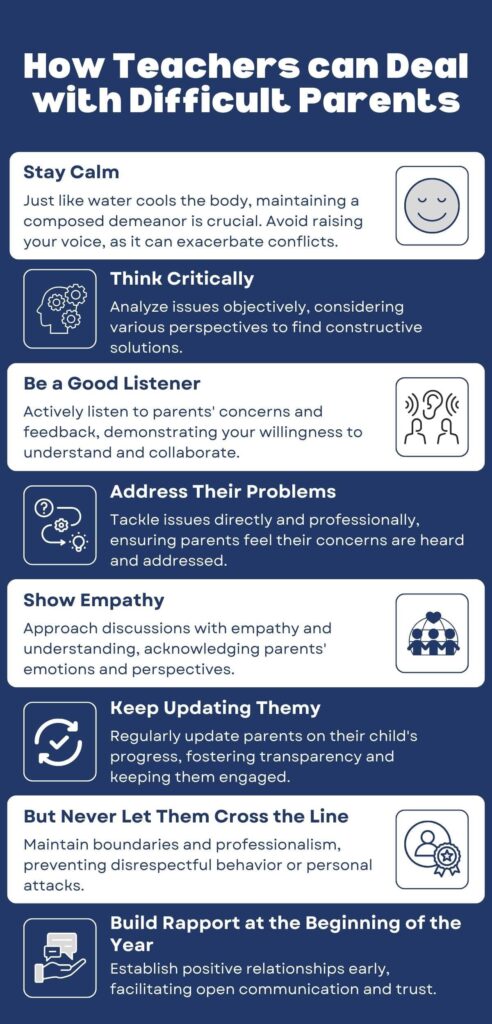A high-school teacher was dealing with a mischievous student in the classroom. After multiple failed efforts, the teacher decided to call the parents of the said student. Two minutes into the discussion the discussion with the parents got heated up. The teacher realised that the apple did not fall far from the tree. But despite the parents’ misbehaviour, the teacher decided to stay calm and then offered them a glass of water. She found it futile to spend another minute with the parents and directed them with their child to the principal. The teacher presented the principal with all the facts and proofs related to the whole situation and got herself out of this difficult situation.

Every teacher has to deal with an additional pair of people along with the student. The parents are much invested in the lives of their children and are eager to stay updated. While it is difficult to stay patient with a room full of young learners, it is much more difficult to deal with an adult version of your students. Not all parents are like this, but every teacher encounters a bunch of rude, misbehaved and difficult parents every year. Thus, it is crucial to learn your way around these parents as an educator.
upEducators has trained 5000+ teachers in developing digital skills. After a lot of discussions with hundreds of teachers on this crucial part of every teacher’s job, we have found the best strategies adopted by educators to deal with difficult parents. So without much further ado, let’s look at the tips from teachers to deal with difficult parents.
Stay Calm (Water gets down the body temperature, Never Increase your voice)
When parents are upset, it can be difficult for teachers to keep their cool. However, it is important to remember that staying calm will help diffuse the situation and allow for a more constructive conversation. Drinking and offering a glass of water de-escalates the situation by lowering the body temperature. It can be helpful to take a few deep breaths and remind oneself that the parents are likely acting out of concern for their child. Once the teacher is feeling more grounded, they can start to address the parents’ concerns. It is also important to be respectful and avoid speaking in a condescending tone or increasing your voice. By staying calm and keeping the lines of communication open, the teacher can help to resolve the issue and maintain a good relationship with the parents.
Think Critically
There are many difficult parents out there who can be quite challenging to deal with. However, if teachers take the time to think critically about the situation, they will be better equipped to handle it. This means taking the time to understand the parent’s perspective and come up with a plan that will work for both parties. It can be a difficult process, but it is worth undertaking to maintain a positive relationship with the parent and to ensure that the child’s best interests are being served.
Be a good listener
Teachers often have to deal with difficult parents, and being a good listener can help them in this process. By listening carefully to what the parent is saying, the teacher can better understand their perspective and find a way to resolve the issue. Additionally, listening also shows the parent that the teacher cares about their concerns and is willing to work with them to find a solution. In some cases, simply taking the time to listen to the parent can diffuse a difficult situation.
Address their problems
Parents can be difficult to deal with, especially when it comes to their children’s education. However, addressing the problems that parents face can help teachers in dealing with difficult parents. By understanding the challenges that parents face, teachers can better communicate with them and find solutions that work for both parties. Additionally, addressing the problems of parents can help build trust between teachers and parents, which can make dealing with difficult parents easier in the long run.
Show Empathy
One way to help diffuse the situation is by showing empathy. This doesn’t mean that you have to agree with everything the parent is saying, but it does mean trying to see things from their perspective and understanding where they’re coming from. This can help to build rapport and trust, which can make it easier to find a resolution that works for everyone.
Keep updating them
Teachers need to keep parents updated on their child’s progress in school. This helps prevent difficult situations with parents who may be concerned about their child’s academic progress. When parents are kept in the loop, they are more likely to trust the teacher and feel comfortable with the decisions the teacher makes regarding their child’s education. Additionally, keeping parents updated also allows teachers to build relationships with parents, which can make dealing with difficult situations much easier.
But never let them cross the line
Some parents can be very demanding, and others can be very critical. It is important for teachers to never let the parents cross the line. If a parent crosses the line, the teacher can lose control of the situation. By never letting the parents cross the line, the teacher can maintain a professional relationship with the parents and can effectively deal with any difficult situations that may arise.
Build Rapport at the beginning year
By getting to know the parents and establishing a good relationship with them, teachers can gain their trust and cooperation. When a problem arises, the parents are more likely to listen to the teacher and work together to resolve the issue. However, if a teacher has a difficult relationship with a parent from the start, it will be much harder to resolve any issues that come up.
Keeping evidence
There are a few difficult parents who, despite a teacher’s best efforts, just don’t seem to be satisfied. In cases like these, it can be helpful to have a record of what the teacher has done to try to address the parent’s concerns. This can be in the form of a written record or even just a list of dates and times when the teacher has spoken to the parent. Having this evidence can help the teacher to show that they have made a genuine effort to address the parent’s concerns and can also help to defuse the situation if the parent becomes confrontational.
Difficult parents can make a teacher’s life difficult. But a teacher must learn to build boundaries and find the best ways to keep their life less stressful due to such parents. If a teacher fails to deal with such parents, it can have a negative impact on the teacher’s personal as well as professional life. As a teacher, you need to be prepared for the worst and this can be done by following simple steps and using the best strategies to keep difficult parents under control.
Author: This article is written by Samiya Rashid for upEducators blog.




